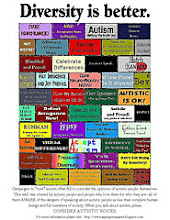Esperanto
Many moons ago when I was just a wee young thing [translation = eternally optimistic] I was confident that this universal language would be the norm by the time I was an adult. Brits are notorious for the weak language facility, especially when compared to the rest of Europe. I skipped over the need to learn Esperanto myself, as I was having more than enough difficulty with French, German and Latin. I longed for the day when I would understand everyone, no matter how they spoke, a time of understanding and tolerance. No more conjugating verbs, declensions and fiddling about with the past imperative. No more pesky ‘amo, amas, amat.’
I have cause to review my weakness in communication skills, as I examine my son’s Speech and Language evaluation prior to his IEP.
The word that leaps of the page at me is ‘unusual.’ His speech delay is well documented but the words ‘atypical’ and ‘unusual’ keep on cropping up.
When I first came across ‘atypical,’ when all terminology was confusing, I was non-plussed. His kind of autism was ‘atypical,’ as was his speech delay. This description tripped me up initially. I had to keep reminding myself that there was ‘typical’ autism, whatever that might be, and ‘typical’ speech delays, goodness knows what they might be, and then there was my son, the ‘atypical’ one.
His speech pathologist gave him the usual barrage of tests prior to the IEP. From this she produced her report, her detailed report and recommendations based upon her findings. She is spot on in every respect. I scribble all over her report, as is my wont, as my son sidles up to snuggle into my side. I underline the numerous identifiable reasons as to why he sounds so much younger than his chronological age of nearly 8. [translation = when he is able to speak loud enough for anyone to hear him] I also ponder her query regarding the pronunciation of the letter ‘R.’ Is this due to immaturity or the English disease? [translation = r’s do not feature as prominently in Britishspeak as they do in American English]
“What you are do?” he asks mid nuzzle.
“I’m reading this report from Mrs. B about your speech.”
“Speech?”
“Yes.”
“It is good it is bad?”
“Good! All good, very good.”
“I is good at dah speech.”
“Indeed you are.”
His feet pummel me, pleased and happy with his performance during testing. He beams with satisfaction, “maybe…..maybe….maybe I don neeed dah speech therapy no more!” I think maybe that depends upon who is listening? [translation = future perfect]






8 comments:
I love your blog :)
It is witty and well-written and I can't stop admiring your kids.
Big smiles from my side of the world :)
Some day I'll ask what is normal and why?? Won't that trip them up.
Any parenting book that says "if your child hasn't done a, b or c by the age of 5"... lies. They haven't met our children.
S.
Esperanto lives! Well sort of, in a kind of, low level way...
Anyway, give more credit to English. It is an irregular and often clumsy language. But because we have no academy, like many other languages, we are free to evolve and change at an astounding rate. Therein lies the genius of our language. English may lack the simplicity and reliability of the Romantic languages, but we can describe ideas and concepts they simply can not.
Our house is not always our home.
Anyway English can be a lot of fun. I hope your chidlren enjoy this aspect of it as they learn.
I've been meaning to hop over and welcome you back to the colonies! I think you're being a too hard on yourself...you have a wonderful way with language. As far as being 'atypical,' I think we're in store for a redefinition of autism (and all its symptoms) sometime soon. Now that we're looking so closely at our kids, we see that there's just more variation than anyone ever imagined. More complexity, more difference, more color. So soon 'atypical' begins to lose its meaning, no?
Maybe it's just me but I think that there's a lot to say for someone being 'atypical' rather than 'typical' as really, who wants to be the same as the masses? Your son is unique and shouldn't be labeled as anything other than a boy. A special boy.
Viva la difference!
Joey is also usually referred to as "atypical." His doctor always says "he has very classic symptoms- but not in a classic combination."
I have no idea what "typical" autism is supposed to be, or what a "classical" combination of "symptoms" would look like. They forget to tell you that part.
Just as well.
I love your sons' ways of speaking. To me it sounds like the language of a very intelligent person who is learning English as a second language.
All three of our sons have atypical speech and language, although I think the ones with autism are considered to have typically autistic language.
I don't know where this leaves us. Out of our whole family, I'd say only the dog is truly typical (but who am I to judge)
Interverbal said: English may lack the simplicity and reliability of the Romantic languages, but we can describe ideas and concepts they simply can not. Our house is not always our home.
Can not? "Nuestra casa no siempre es nuestro hogar" (in Spanish)
And, yes, Esperanto lives.
Post a Comment